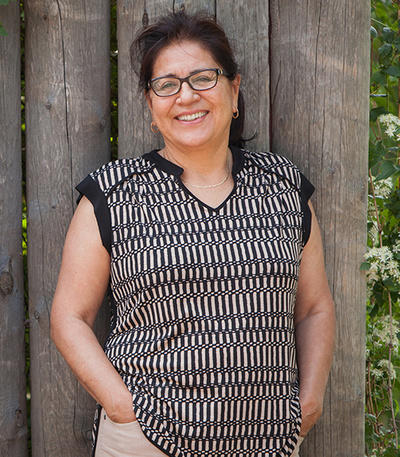Nov. 24, 2017
Schools and organizations across Canada embark on journey to indigenize

Betty Bastien, the director of academic programs at Red Crow Community College on the Blood Reserve.
How do we go about indigenizing a university? Schools and organizations across the country have been embarking on this journey of late, but what does it mean to indigenize education?
The intent is to transform educational and cultural experiences of students, faculty and staff in order to provide a much more inclusive environment while tearing down barriers to Indigenous student enrolment and recruiting of Indigenous faculty and staff. But according to Betty Bastien, retired associate professor in social work and currently the director of academic programs at the Red Crow Community College on the Blood Reserve, indigenizing education requires a much deeper commitment to understanding and integrating Indigenous perspectives than many realize.
“The foundation of indigenization needs to come from Indigenous ways of knowing,” says Bastien, a member of the Piikani First Nation, part of the Blackfoot Confederacy. “Ultimately, for any society, knowledge or the ways of knowing is the way societies perpetuate themselves. So how can we as Indigenous people perpetuate our society when the continuity of our culture is dependent on our ways of knowing? To me that’s fundamental. There needs to be a way for the universities to incorporate the Indigenous ways of knowing in the curriculum, so Canadians will have diverse perspectives in understanding how knowledge is constructed and their impact on humanity and the environment.”
It can’t simply be about adding a course on Indigenous history, it must involve getting at the core of what it is to be Indigenous in Canada and sharing that with the campus community by weaving Indigenous knowledge and perspectives throughout all programs of study across the campus and in all faculties.
At the heart of Indigenous ways of knowing is language. And this, says Bastien, needs to be offered as an immersive cultural experience.

Dru Marshall is gifted a Blackfoot name (Chickadee Song) by Dr. Reg Crowshoe.
Riley Brandt, University of Calgary
“One thing that’s really critical for the sustainability of our Indigenous cultures is the language. It’s language that holds our knowledge systems, our kinship systems, our relationship to the lands, our ceremonial protocols. We do not have a generation to carry the language. If you’re going to indigenize education, Indigenous people have to have the resources to be able to have the language sustained in its authenticity. And authenticity is the big challenge,” says Bastien who published a book, Blackfoot Ways of Knowing with the University of Calgary Press in 2004.
“The language nurtures the soul, it nurtures the spirit and it connects you to relationships that you can recognize in the Blackfoot world. That includes the cosmologies. So that’s where our identity comes from. That’s the essence of indigenization.”
Bastien did her bachelor and master of social work degrees at the University of Calgary and completed her PhD through the California Institute of Integral Studies. Her doctoral work was on the Blackfoot ways of knowing, leading to her book.
She believes universities should be building close partnerships with First Nations colleges such as Red Crow Community College where the process of indigenization is already well underway. First Nations colleges with elder advisory councils can offer help and guidance in how to Indigenize education. It’s a process that should be embraced by Indigenous and non-Indigenous students, faculty and staff alike as it can offer a whole new world view — one that Bastien says is much more holistic and universal in scope.
“Humanity is crying out for a new way, for a perspective of who we are as human beings. If all you are is concerned about making a living, do you know how narrow that is for the potential and possibilities of what human beings are? For who we are?” says Bastien. “That has led to our planet to being in a crisis because we’re all worried about making a living. We’re destroying ourselves with that notion of making a living.
"But what are the possibilities of what human beings are beyond your job? Indigenous knowledge systems offer the possibility of exploring who we truly are as human beings. It’s a whole different way of thinking that will liberate us as human beings.”
The University of Calgary unveiled its Indigenous Strategy, ii' taa' poh' to' p, on Nov. 16. The strategy is the result of nearly two years of community dialogue and campus engagement, and involved the work of a number of people from the university, Indigenous communities and community stakeholders. Recommendations from the strategy will be implemented in the coming weeks, months and years as we move forward with promise, hope and caring for the future.
